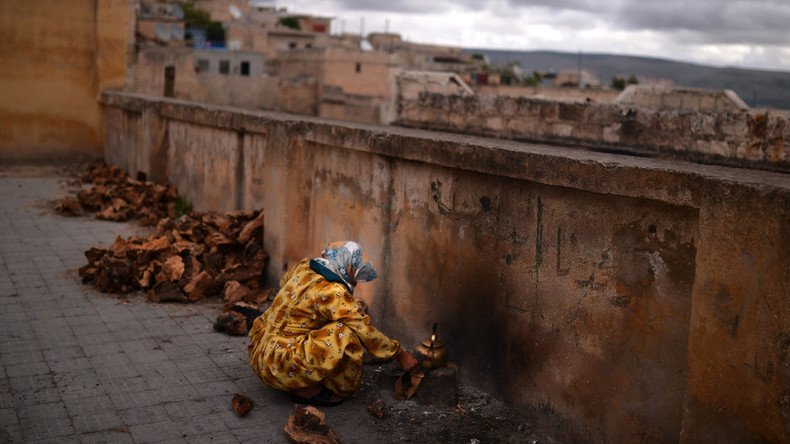‘We are afraid but won’t leave our land’: Syrian Kurds who survived Turkish shelling tell RT

They lost their relatives, saw their neighbors die in shellings, they have no home and no future – residents of Kurdish-controlled towns in Syria, attacked by the Turkish military, spoke to RT’s Lizzie Phelan of their misery on the frontline.
Residents in Afrin, northern Syria, made it clear to Phelan that the city was until recently one of the safest in Syria, ever since Kurdish militia from the YPG (People's Protection Units) seized it in 2012. It has been crowded with refugees turned away from the Turkish border.
However, several weeks ago the province was shelled by the Turkish military, which is now targeting Kurdish forces in northern Syria.
“Oh God, there is bombing in Aleppo, bombing here, help God! Where should I go? Where? Help God!” Jamila, an Afrin resident, cried. She lost her grandson Mohamed in the attack. A 17-year-old girl called Jaylan was also killed.
“He’s not at home, he’s not at home. …Mohamed is dead, Jaylan is dead,” the woman was wailing.
Other Afrin locals say that since the attack, they fear for their lives.
“Yes, we are afraid but we won’t leave our land, we won’t go anywhere from here, even if all of Afrin’s citizens die we won’t leave our land…” a man named Khaled told RT, adding that his neighbors, who were killed in the attack, were just poor people struggling to survive.
He showed RT the traces of the shells that fell.
“Right here, the first one landed here in the garden, the second one right here, the third one in the village of Terende. The fourth fell behind the village.”
The RT crew also visited the nearby village of Maryamayn, where they witnessed more destruction and grief. One resident, Weis, said his house came under Turkish shelling.
part of Weis' house in #Afrin province damaged by #Turkish shelling. #Syriapic.twitter.com/xhA1oatUP0
— Lizzie Phelan (@LizziePhelan) March 5, 2016
“We were sitting here one afternoon when the first shell fell to the east of the house. There was so much dust, we began to get up and then came the second shell. I was sitting on that chair, a stone from the wall hit me, the chair broke and I fell down,” he said.
Another village, Tinib, shelled by Turkey, is now a ghost town; there is literally nobody left there. Everyone fled in during the shelling and many houses have been destroyed.
Ankara has been stepping up military activity recently in the areas with a predominantly Kurdish population, which include its own territories in the southeast as well as places in northern Syria and Iraq. Among these territories is the Syrian Afrin district. It has a predominantly Kurdish population was estimated to be inhabited by more than 170,000 people, according to a 2004 census.
#Aleppo-#Afrin pretty much all the way like this pic.twitter.com/5BnWIOtcuh
— Lizzie Phelan (@LizziePhelan) March 3, 2016
The Kurdish region in northern Syria is a stronghold of the Democratic Union Party (PYD) and its activists, as well as the YPG militia. Turkey has claimed that PYD is affiliated with the Kurdistan Workers' Party (PKK), which is considered a terrorist group by Ankara and its US ally.
Although Turkey views the PYD as merely a Syrian branch of the PKK, the US has backed the Syrian Kurds. They have been one of the key forces fighting against Islamic State in the region. Ankara has been sending diplomatic signals to Washington, voicing its discontent with Washington’s support of the Syrian Kurds.












